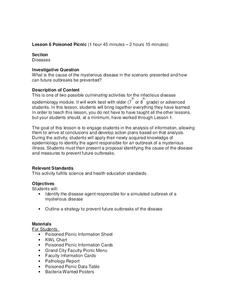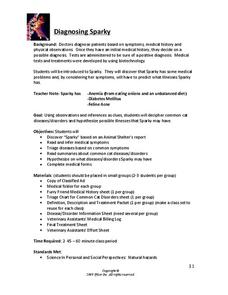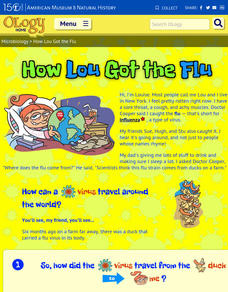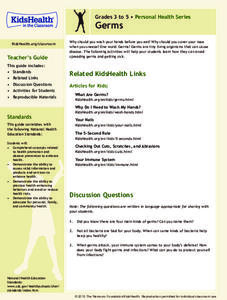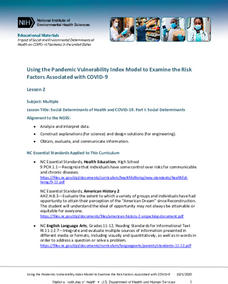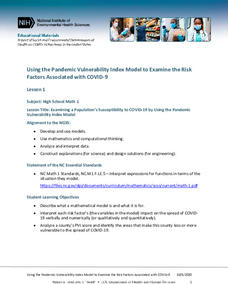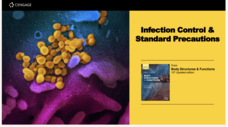Core Knowledge Foundation
Maya, Aztec, and Inca Civilizations
A 10-lesson unit explores the Maya, Aztec, and Inca civilizations. Over the course of two weeks, scholars read nonfiction excerpts, discuss their findings, and complete activities. An assessment equipped with multiple choice and matching...
Center for Technology in Teaching and Learning
MedMyst Mission 1: Orientation at O.R.B.
A dozen years after a great plague wipes out the majority of Earth's civilization, a group of scientists joins together to fight infectious diseases. Scholars join the training mission and learn about viruses, bacteria, pathogens and...
Centers for Disease Control and Prevention
Poisoned Picnic
A group of teachers attended a picnic; ten became sick and another four died. Young scholars must solve the mystery of what happened. They research the river, waste water treatment plant, each food that was served, and environmental...
Centers for Disease Control and Prevention
Teach Mrs. Jones' Class about Microbes
During a biology lesson plan, scholars research microbes, design a lesson plan using an outline, and present the lesson plan to the class.
Curated OER
The Science of Microbes
Looking for an interesting text to share the world of microbes with your middle school classroom? The edition contains explanations, worksheets, experiments, discussions, and links to outside sources for a true and complete...
Howard Hughes Medical Institute
How Novel Icefish Genes Can Improve Human Health
Designed to accompany the 13-minute video The Making of the Fittest: The Birth and Death of Genes, this handout serves as both a viewing guide during the video and an analysis of how the adaptations of the icefish might help treat...
Baylor College
Infectious Disease Case Study
Small groups of life science learners look at Allison's symptoms and discuss a diagnosis. They use a chart of illnesses and draw symptom clues from an envelope to determine what illness she has. A lesson like this gives children an...
Baylor College
Mapping the Spread of HIV/AIDS
Where is HIV/AIDS most prevalent and what are the current trends regarding HIV? Have groups work together to map the world's HIV/AIDS rates, then create a class map with all the data. Lesson includes cross-disciplinary concepts including...
John Hopkins University
Diets and Influence on Food Choice
From start to finish, this is a truly excellent lesson plan addressing the epidemic of diet-related disease in the United States. Learners begin with a reading excerpt of detailed information on trends in the American diet and the...
Curated OER
Then and Now: Public Health from 1900 to Today
Throughout the 20th Century, the world has become a healthier place. By examining the public-health issues and diseases doctors faced during the 1900's, students will compare and contrast life from today vs. life in the 1900's. Their...
Beyond Benign
Diagnosing Sparky
Be a vet for a day! Scholars test their veterinarian skills by assessing symptoms and making a diagnosis. They then evaluate biotechnology tests to verify the diagnosis.
Beyond Benign
Urine Jeopardy
Urine can tell us a lot about what is happening in our bodies. In a hands-on activity, scholars administer pH, glucose, ketone, and protein tests to a sample of "urine" solution made from household ingredients. Their results lead them to...
Beyond Benign
ACNE (Another Cat Needs Exfoliation)
Take solace, teens ... cats get acne, too! After making a diagnosis in the previous lessons in the series, learners must now decide on a treatment to complete the sixth installment of this biotechnology unit. The typical treatment for...
DocsTeach
Uncle Sam and the American Diet
Uncle Sam wants you to follow the food pyramid! Scholars analyze two images of propaganda posters the government created to promote the food pyramid. Academics complete a worksheet to understand the impact of the campaign and end the...
Health Smart Virginia
Stress Management - Doctor Disease
Doctor, doctor, help me please! As part of their study of the correlation between disease and illness, middle schoolers take on the role of doctors. They rotate through 10 learning stations, read about patients' symptoms, and write a...
American Museum of Natural History
How Lou Got the Flu
Six questions probe participants to discover the possibility of catching a virus from others—even animals. Here, the influenza virus travels from duck to person in a round-about way. The quiz concludes with helpful tips to stay...
National Institute of Environmental Health Sciences
A Student Exploration of the Global Impacts of Climate Change on Human HealthVector-Borne Diseases
Develop an understanding of how climate change affects humans' health. The class lists what they know about climate change and its connection to disease and then read sections of an article providing specific details on how climate...
Children’s Hospital of Philadelphia
Development of Disease and Infection
It's all in the cards. Using cards to simulate a disease's attack on the immune system, pupils develop an understanding of how the immune system and pathogens react to each other and why at times the pathogen wins. Groups play a game to...
Nemours KidsHealth
Germs: Grades 3-5
Infection prevention is the focus of two lessons. In lesson one, scholars take a brief quiz, survey peers, and discuss prevention techniques to stay healthy. Lesson two examines how germs work—transmission, symptoms, treatments, and...
Cengage Learning
COVID-19: What Can I Do?
Eleven slides make up a presentation that details the importance of practicing social distancing and what can be done at home during the COVID-19 pandemic. Scholars take part in the classroom discussion highlighting topics such as...
National Science Teaching Association
Why Do We All Have to Stay Home?
Learners, especially young ones, might be confused about why or frustrated that we have to stay at home. Help answer questions and calm emotions with a nine-page resource that details topics regarding the COVID-19 pandemic.
National Institute of Environmental Health Sciences
Lesson 2: Using the Pandemic Vulnerability Index Model to Examine the Risk Factors Associated with COVID-19
A lesson asks young mathematicians to investigate the social determinants and the environmental factors that influence risk factors associated with the spread of COVID-19. Class members then brainstorm what they can do to alleviate the...
National Institute of Environmental Health Sciences
Lesson 1: Using the Pandemic Vulnerability Index Model to Examine the Risk Factors Associated with COVID-19
How vulnerable are you to COVID-19? High school mathematicians use the Pandemic Vulnerability Index to create models that help them collect and analyze data about the risk factors associated with COVID-19. After investigating four groups...
Cengage Learning
Infection Control and Standard Precautions
With the number of COVID-19 cases rising dramatically, information about how standard precautions can be used to control infection is essential. The 16 slides in a presentation outline of how people need to change their daily habits to...




